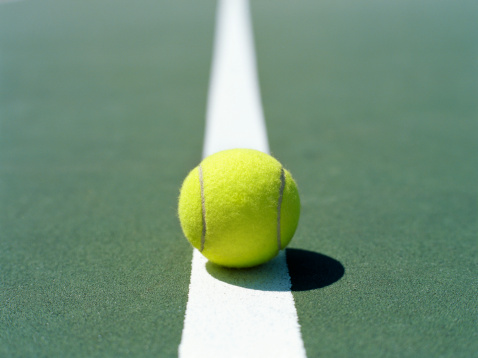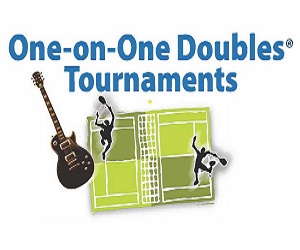Mythbusters: Do College Results Mean Anything to Professional Tennis Players?

Last issue’s interviewee Jim Thomas and this month’s interviewee, Jeff Salzenstein, played professional tennis for 10-years after graduating from Stanford in 1996 and have some good insight and advice about tennis life as a pro, college and junior player to share.
Jeff Salzenstein is the oldest American ever to break the top 100 in the world at the age of 30. In college, Jeff was a two-time NCAA All-American, Team Champion and Stanford Captain. Jeff is the creator of online tennis instruction membership site Total Tennis Training Inner Circle, and is the president and founder of JRS Sports LLC.

What were the biggest differences between college tennis and pro tennis on-and-off the court?
Jeff Salzenstein: On the court, the day in and day out grind of playing professional tennis was at a much higher level than college tennis. Certainly, college tennis prepped me for professional tennis to be able to play at that level but we only had three or four really solid duel matches a year against the UCLAs, the USCs and Georgias of the world.
As a pro, you’ve got to have a bigger serve, a better approach shot, you must be able to have that all-court game and you just cannot get away with as much as you can in college.
In terms of the off-the-court differences, pro tennis is a full time job. It’s 24-7, you’re always thinking about your training, recovery, massages and practice. The travel schedule is absolute grueling—you could be on three or four different continents within a month or two of each other.
And of course, in college, there’s much more balance. You’re going to class, you might be in a fraternity, you practice a couple of hours a day, but it’s just not as rigorous. You have time off. And it’s also not quite intense because you’re not relying on winning tennis matches for your livelihood.
Do you have a preference between professional tennis, college tennis and junior tennis?
Well, I loved junior tennis, college tennis and professional tennis for different reasons. Obviously, in junior tennis, you’re kind of getting into the scene, you’re loving just meeting new kids and new people, and you’re getting that first taste of traveling. So it’s a lot of fond memories from junior tennis.
In college tennis, it was amazing. Some of my best memories were winning the national title at Stanford two times with some great teammates. Just playing for a team, the camaraderie, having people supporting you, that’s a once in a lifetime experience that I recommend to just about any junior tennis player.
And of course, the thrill of playing pro tennis, playing on that big stage, playing the Grand Slams, playing in front of thousands of people, that was amazing too.
But if you had to ask me to pick one, I would go with college tennis for the mere fact that you’re playing with a team. You don’t get to do that on the pro tour—you are on your own a lot, traveling. And just that thrill of sharing, in our case, a national championship at Stanford, that’s something you just really can’t replace. So I’m going to say college tennis was the most enjoyable experience for me.
What are your fondest college tennis memories?
My fondest college tennis memory was when Ricky Becker saved match points against Georgia when we were down three matches to two. He saved match points against a very talented player from Egypt, and we ended up winning the seventh match, the clinching match. We came back to win the national title. It was moments like those that helped us obviously win the national title, but just that entire experience is one of my fondest memories.
Certainly, winning those two national titles as a team was something you just cannot top and you cannot relate to unless you experience it. Those were some amazing times back at Stanford.
Of course, playing Michael Chang at the U.S. Open in 1997 as a pro, my first year on the tour, was one of my fondest memories as well. Just having that experience to play in Arthur Ashe stadium in front of 25,000 people, on a Friday night match … people still mention that match 15 years later, it’s just quite ironic, but that was an incredible experience to play under the lights in New York City.
I went back to the U.S. Open this year, 15 years later. It was hard to believe that so much time had passed. But it was really phenomenal to play the number two player in the world and make it a competitive match, and it was amazing to share that with my friends and family who were in the box or watching on TV that evening.
You won the first set, too.
Yup.
What advice do you give to a junior player who is going through the college recruiting process?
I think the most important thing is to identify the place that the junior tennis player is most interested in going for college and to look at where they are going to be happiest. When I made my decision to go to Stanford, it really came down to where I would be happiest if I could not play tennis.
Of course, tennis is the dream and it’s very important to keep that dream alive and to play four more years. But I really think someone’s happiness is the most important thing to look at when you’re deciding on where to go to college.
What advice do you give to a current college tennis player who is probably looking to play the circuit professionally after they graduate?
Number one … when you are getting ready to move from the college level to the pro level, I think securing financial sponsorship or financial aid in some regard is absolutely essential. If you are going to try to make it driving around in a van for a couple of years, you’ve got another thing coming. You need to have that financial support, the coaching, and the support in your corner. Trying to do it alone and play against the best players in the world is virtually impossible.
Do you subscribe to the theory that it is hard to break into a college starting lineup if you don’t start the first year or two?
Yes, I think it’s very difficult to become a starter in college if, after your second year in college, you’re not in the starting lineup. The reason being is that there is always new, fresh, young talent coming into a program. If a new recruit is coming in and they are not a top recruit, then that coach is probably not doing their job with recruiting.
Hopefully you are in the lineup by your sophomore or junior year. At least you’ve kind of planted those seeds for those first couple of years.






